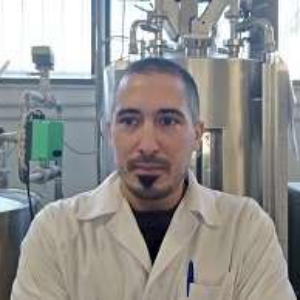Giovanni De Francesco, University of Perugia, Italy
The global no-low alcoholic (NoLo) beer market was valued at over $22 billion in 2022 and is expected to grow at a compound annual growth rate (CAGR) of 5.5% from 2023 to 2032 [1]. This growth is driven by increasing consumer preference for healthier alternatives to alcoholic bev [....] » Read More

















































Title : Predicting Salmonella inactivation in water from bubble sparkling cold plasma treatment
Kasiviswanathan Muthukumarappan, South Dakota State University, United States
Microbial contamination in food and water poses significant health risks, and conventional treatments have limitations. Cold Plasma technology offers a non-thermal alternative, generating reactive oxygen and nitrogen species (RONS) like ozone, nitrate, nitrite, and hydrogen perox [....] » Read More
Title : Liquid-liquid phase separation in hetero protein systems: Specificity and recent advances
Said Bouhallab, INRAE, France
Liquid-liquid phase separation (LLPS) is a captivating phenomenon in which a uniform component mixture spontaneously divides into two liquid phases, a component-rich phase (complex coacervates) in equilibrium with a component poor phase. It is prevalent in soft matter and highly [....] » Read More
Title : Bioactive compounds and stability of fiber and protein enriched salted snacks by olive paste and brewer’s spent grain
Ombretta Marconi, University of Perugia, Italy
This research project aims to formulate functional snacks through the upcycling of by-products from two production chains: the brewing and the olive oil production chains. The salted snacks were formulated by partially substituting wheat flour with brewers’ spent grains (BS [....] » Read More
Title : Project EQVEGAN offers innovative trainings for food industry to strengthen competitiveness on the food market
Zbigniew Stanislaw Krejpcio, Poznan University of Life Sciences, Poland
Over the past decade, the food industry worldwide has experienced profound transformations, driven by urgent issues such as sustainability, health concerns, and a widening skills gap in the job market. One of the most remarkable changes has been the rapid technological advancemen [....] » Read More
Title : Challenges in sugar production - Food safety management systems
Biljana Bogdanovic, Sunoko, Serbia
Sugar industry is one of the largest among the food industry. One plant processes around 8,000 tons of sugar beet daily and produces 1,150 tons of sugar. It can be said that sugar is a strategic product of Serbia. Through this book the products of the sugar industry will be intro [....] » Read More
Title : Whey from waste to a valuable technological resource based on the polish market
Ewa Czarniecka Skubina, Warsaw University of Life Sciences, Poland
Whey is a liquid by-product formed in the natural fermentation during the manufacture of cheese, casein, or similar products by separating from the curd after coagulating milk and/or products obtained from milk. Over the last two decades, whey production in Poland has doubled, wh [....] » Read More
Title : Consumer acceptance for cell-based seafood in EU: A multi-country study
Antonio Borriello, European Commission - Joint Research Centre, Italy
The cell-based food industry is garnering significant attention from investors, including major corporations such as Nestlé and Tyson Foods, due to its potential to revolutionize the novel food market. However, in addition to overcoming technical and economic hurdles, the [....] » Read More
Title : Nutritional potential and fermentation properties of edible Heinsia crinite, Piper guineense and Xylopia aethiopica from Angola
Pengren zou, University of Vigo, Spain
The medicinal and edible plants from Angola, Heinsia crinita (H. critina), Piper guineense (P. guineense) and Xylopia aethiopica (X. aethiopica) generally sold at the local African market to treat malaria or for women´s health. Few information is known about the composition [....] » Read More
Title : Studies on biofilm growth and total polyphenolic content of fermented beverages
Joanna Orzel, University of Silesia, Poland
Fruit vinegar and kombucha are two types of fermented drinks known worldwide. They are produced by the selected types of microorganisms from fruits or infusions. Thus, these beverages are recognized as beneficial for our health due to the microorganisms and polyphenols they conta [....] » Read More
Title : Development of golden chlorella – starch ink for 3D printed dysphagia diets
Song Yi Koo, KIST Gangneung Institute of Natural Products, Korea, Republic of
Golden Chlorella (GC) with various nutrients have high potential for 3D food printing applications in the diet of patient with dysphagia. Rheological, textural, printability, and other characteristics of starch ink with starch types were estimated. Corn starch (CS) and potato sta [....] » Read More
Title : Potential of yeast Candida spp. and Pichia spp. to adhere to stainless steel surfaces under various growth conditions and their control
Ruzica Tomicic, University of Novi Sad, Serbia
Yeast adhesion followed by biofilm formation on the surface of materials commonly used in food processing, such as stainless steel, has attracted much attention because these surfaces can become a potential source of contamination that may seriously affect food safety and quality [....] » Read More
Title : Fatty acid profile of butter derived from different locations in Poland
Jaroslawa Rutkowska, Warsaw University of Life Sciences, Poland
Milk fat is the most complex of all edible fats, containing many fatty acids (FAs), from C2 to C28, including even- and odd-numbered, saturated, monounsaturated and polyunsaturated, cis and trans, linear, and branched. Many exhibit biological and physiological properties and are [....] » Read More
Title : Optimization of zearalenone and trichothecenes detection by GC-MS
Ziyang Jia, University of Vigo, Spain
Mycotoxins are potentially toxic secondary metabolites produced by many filamentous fungi from genera Fusarium, Trichthecium, Myrothecium, Stachybotrys and Xylaria. In recent decades, more efficient analytical methods (with higher sensitivity and resolution) have been progressive [....] » Read More
Title : Investigating the effects of superchilling storage on the microstructure of beef meat
Anjelina William Mwakosya, INRAE, FRISE, France
Superchilling offers a promising approach to extending the shelf life of fresh products beyond conventional chilling, without the adverse effects associated with freezing. The final quality of the product is primarily determined by the ice volume fraction and the properties of ic [....] » Read More
Title : Patent-based evidence synthesis on the use of nanocellulose in pickering emulsions: A quantitative assessment of assignees and geographical distribution
Latife Cagla Coklar, Ondokuz Mayis University, Turkey
Pickering emulsions, stabilized by solid particles rather than surfactants, have gained considerable attention in recent years, particularly in the food industry, due to their advantages such as sustainability, low toxicity, and high stability. Among natural stabilizers, plant-ba [....] » Read More